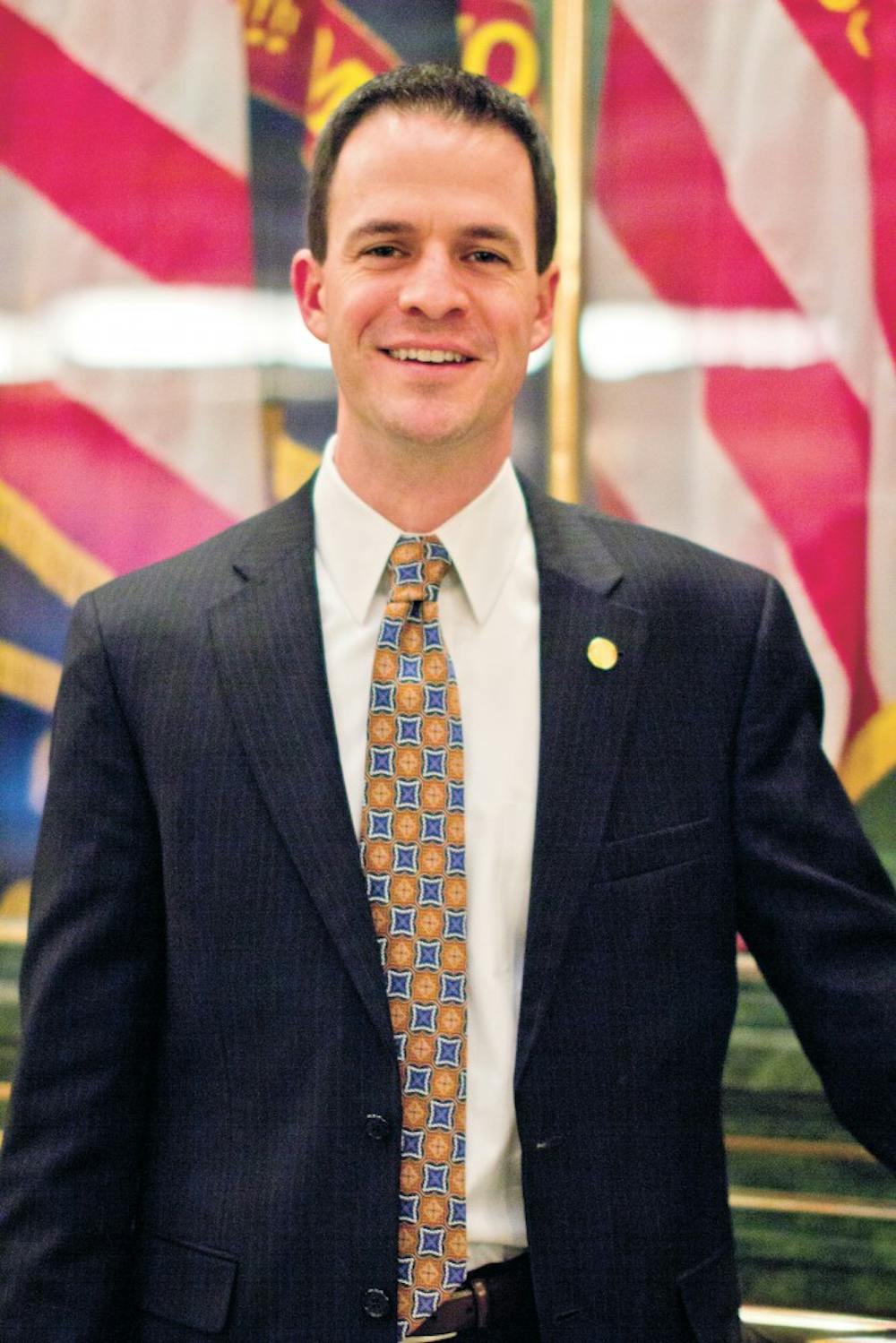House of Cotter
CMU grad and newly appointed speaker of the state house aims to foster stronger relations in state government

Comfortable in a small, downtown Mount Pleasant law firm, the thought of public office never crossed Kevin Cotter's mind.
As he engaged in the daily workings as partner at Kerr Law Firm, PLLC, Cotter shared opinions about state politics, but never considered leading the conversation.
That was 2009.
Today Cotter is the speaker of the Michigan House of Representatives, leading an essential arm of state legislature. The 1999 Central Michigan University business graduate is determined to lead Michigan as it begins to overcome a trying economic climate.
"I was very opinionated as to the direction of our state," he said. "I finally decided it was time for me to stop complaining and get involved."
Cotter explained the struggling state economy, along with the growing needs of college students, lead to his first run for state representative. He was elected in 2010, representing District 99, which includes Isabella County.
Cotter said a family member had graduated from CMU with a teacher education degree, and subsequently took a job in Florida where they still reside.
College graduates leaving Michigan was an issue he felt he needed to address. He said he also considered the future of his home state, where he planned to remain with his wife for many years.
"It was that specific example, and then sort of the broader narrative I was hearing," Cotter said. "After discussions with my wife, I looked at what the state would look like in 20 years if we decided to start a family."
Elected to the House of Representatives in November 2010, Cotter started his work in January 2011. He made it through two re-elections, and is now in his final term as state representative.
Selected as Speaker of the House in November 2014, Cotter will serve in that role through the 2015-16 legislative session.
The Speaker of the House is responsible for leading the caucus, which is the group of Republican representatives in the House.
The position also appoints committee members, negotiates with the governor’s office and decides which bills are brought to the floor for a vote. Cotter said he hopes these powers give his native community a voice in state politics.
Leading the House, across party lines, Cotter hopes to maintain healthy negotiations within the legislature, despite differences of opinion even within his own party.
Rural Roots
Graduating from Shepherd High School, Cotter transferred to CMU from Ferris State University, where he planned to major in professional golf management.
At CMU, he majored in business with a minor in entrepreneurship. Cotter also earned a Master's of Science in Administration from CMU, and later attended Thomas M. Cooley Law School for his Juris Doctorate Degree.
State Sen. Judy Emmons, R- Sheridan, said Cotter's new position will strengthen northern and mid-Michigan's grasp on policy and laws throughout the state. Cotter will be able to foster a stronger relationship between rural politicians, and those from metropolitan areas such as Grand Rapids and Detroit, Emmons said.
"It's a great opportunity for central Michigan," she said. "As a leader, he has to be aware of the people he leads. We need someone who understands the issues of the area we live in. Lots of times (house leaders) are from more urban settings. We've had leadership before, but it's uncommon. There are misperceptions that we're kind of out in the wilderness. It's partly because they think we don't understand them and they don't understand us. You have to have a balance."
With less big businesses and job opportunities in the area, Emmons said representing the interests of his district while leading the house could be difficult for Cotter.
"There are challenges in this area," Emmons said. "Where we live, we don't have a lot of big opportunities and businesses. I don't believe he'll play sides. We've been on the same page as far as the needs of our community. It's a challenge, but he's up for it."
State Senate Minority Whip Curtis Hertel Jr. D- Meridian Township said he is hopeful Cotter's leadership will continue a pattern of cooperative negotiations.
"Kevin has a good history of working with both sides of the aisle," Hertel said. "Obviously there are pressures, but I hope that will continue. It's about balancing the needs of your caucus and your state. There's politics and there's policy."
Central Michigan Life was unable to reach House Minority Leader Tim Greimel for comment on this story.
Associate Editor of Inside Michigan Politics and political analyst Bill Ballenger said Isabella County has seen an increase in state leaders during recent years.
Pointing to Republican Gov. John Engler who served from 1991-2003, along with Emmons and the previous speaker Jase Bolger R-Marshall, he said Republican leaders are typically from more rural areas of the state.
"No other county in the state has produced as much leadership as Isabella," Ballenger said.
Lt. Gov. Brian Calley said the recent influx of leaders from Isabella County and Mount Pleasant has left a lasting impact on the state legislature as a whole.
"Mount Pleasant and Isabella County have a strong legacy of sending leaders that leave a positive impact," Calley said. "That's an area that produces the type of public servant that knows how to be successful through mutually beneficial relationships. It's great for the community, and CMU, to have a leader who was formed and shaped in that community."
His roots in a region more rural than many leaders of the state legislature, Cotter said he hopes to give his home a stronger voice in decision making.
"As you go north, the number of districts is a small number," Cotter said. "It's an opportunity for the more rural areas to have a louder voice in the process."
Firmly believing his impact is best made staying in the state where he was raised, Cotter said he has multiple plans to keep other graduates living and working in Michigan, by keeping tuition costs down and maximizing jobs available to students completing their education.
"We put a limitation on the amount that a school can increase tuition," he said. "In 2011, we had a reduction in the budget. It was a tough year. But we still put the restraints in because we want schools to absorb some of that and not pass it all on to students. As the money coming in has gone up, then the amount we've allowed schools to increase tuition has gone down."
He also said the legislature is attempting to make Michigan a better place for jobs to be created, while increasing college graduates and keeping taxes down despite having to pay off the state's debt.
"It's kind of a chicken or the egg scenario," Cotter said. "Do we create the jobs first so that students that graduate can take the jobs, or do we put all the focus on graduating the talent and hoping the jobs follow. It's a blended approach."
Crossing the lines
Ballenger said Cotter's impact will come from experience. A former state representative and senator, Ballenger said despite being fairly new to the legislature, Cotter has had more time than most speakers to become acclimated with the state political scene.
"Cotter will be the first speaker to have two terms under his belt in the 21st Century," Ballenger said. "So he has a little more experience going into this job than anyone has this century. He's not a guy who's been into politics. The idea that someone like that would just decide to get in there is really impressive."
Referring to Cotter's refusal to appoint the House Democrats' recommendation for minority vice chair of the appropriations committee — which angered Democrats in late January — Ballenger said Cotter will have to work to foster a good relationship with Minority Leader Tim Greimel.
"The bottom line is the speaker has the power," Ballenger said. "Let's see how they get along as this session continues."
Ballenger pointed to term limits as a challenge for Cotter, and all state politicians, in forming relationships with each other. State representatives are limited to three, two-year terms.
"Today, these members are there for such a short amount of time," Ballenger said. "You got guys who really don't know much about each other, but they still have to work together. It's more difficult."
Calley said the difficulty in serving as speaker stems from the multitude of communities represented in the house.
"I consider the job of speaker to be among the hardest in the state," he said. "Leading a body of 110 people from 110 different places, and coming to a consensus is very difficult. It's important that you have a leader that can maintain a very calm, professional demeanor in the face of drama."
Cotter said he is up for the challenge. Explaining that debates only strengthen the legislation drafted and enacted on the state level, he said he welcomes differences of opinion when making decisions.
"I think people would be surprised that we do have differences of opinion, not just with the Senate and the Governor, but we have differences of opinion sometime within our own caucus," Cotter said. "I really enjoy that process, it makes bills better."




